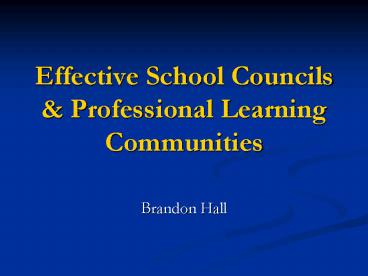Effective School Councils - PowerPoint PPT Presentation
1 / 16
Title:
Effective School Councils
Description:
What will it take to transform TUSD school councils into ... Gleason, Sonia; Donohue, Nick; & Leader, Gerald. ' Boston Revisits School-Based Management. ... – PowerPoint PPT presentation
Number of Views:35
Avg rating:3.0/5.0
Title: Effective School Councils
1
Effective School Councils Professional Learning
Communities
- Brandon Hall
2
Question
- What will it take to transform TUSD school
councils into Professional Learning Communities? - How does this align with current research?
- Where are we now?
- What is our goal?
3
Relevance
- TUSD School Council Policy
- Board Policy that
- AZ House Bill 2551
- HB 2551 (school councils performance training)
This bill would require a school council to
annually assess the performance of the school
principal on a form developed by ADE. The site
council must transmit the performance assessments
to the district Superintendent and the
performance assessments are required to be posted
in "a public area of the school and on the
schools web site." Further, the bill requires
ADE, in cooperation with public, private, and
nonprofit organizations, develop and implement a
program to provide annual training in statewide
locations to school council members. ASBA
OPPOSES, as the responsibility to evaluate
principal performance is vested with the district
Superintendent and school district governing
board. Further, it is inappropriate to post
personnel performance evaluations rather, these
should be retained in a persons personnel file.
This bill failed House Third Read on a 22-34-4
vote.
4
Reasons for School Councils
- Positive
- Shift the balance of authority among school,
district, state - Broaden the decision-making base
- Decentralize management improve efficiency
- Negative
- Weaken entrenched school boards
- Create illusion of reform without investment in
resources - Shift blame for failure to individual schools
5
Alignment with Research 1
- Who Decides What?
- Roles and responsibilities must be clearly
defined - Jurisdiction, scope, authority and responsibility
must be delineated
6
Alignment with Research 2
- Internal Elements for Success
- Committee Structure
- Enabling Leadership
- Focus on Student Learning
- Focus on Adult Learning
- School-wide Perspective
7
Alignment with Research 3
- External Elements
- Long-term commitment
- Curricular guidance (framework to work within)
- Access to Information
8
Baseline Data
- A Survey was delivered (online) to the site
councils at 23 representative schools in TUSD. - They encompassed 16 elementary, 4 middle, and 3
high schools. - Economic and ethnic demographics were considered
for their selection. - None of them applied to be TUSD School Council
pilot schools so that we would not duplicate
efforts as a part of that plan.
9
Baseline Data Respondents
10
Baseline Data - Decisions
11
Baseline Data - Relationships
12
Baseline Data - Accomplishments
13
Baseline Data - Topics
14
Future Goal
- TUSD School Councils will become professional
learning communities who work together to improve
student achievement. - Everyone will have a voice.
- This collaborative/participatory design will
model the democratic values we hope to instill in
our students.
15
Training Needs
16
Sources
AERA Are School Boards an Effective Means of
School Governance?. Ed. Lindle, Jane Clark. 1998.
Univeristy of Kentucky.
David, Jane. "The Who, What, and Why of
Site-Based Management." Educational Leadership
Jan. 1996 4-9.
Gleason, Sonia Donohue, Nick Leader, Gerald.
"Boston Revisits School-Based Management."
Educational Leadership Jan. 1996 24-27.
Peterson del Mar, David. "School-Site Councils
The Hard Work of Achieving Grassroots Democracy."
ERIC Digest 89 1994 1-52.
Sewall, Angela Maynard. "New School Governance
The School Board and its Future." EDRS 11/1996
2-13.































